Descending the steep, narrow plank, inch by inch, hand over hand along the long pole, I thought: “This better be one hell of a cave!” Exploring the other-worldly interior of Hang Trong Cave was to be one of many surreal experiences I was to have traveling along Ha Long Bay in northeast Vietnam.
In the 1992 movie Indochine, credited with putting Ha Long Bay on the map, Catherine Deneuve describes it as “the most remote outpost of Indochina.” Today, the bay still retains that end-of-the-Earth, Lord-of-the-Rings-on–water quality.
The very few guesthouses at that time have now flourished into almost 300 accommodations of every comfort level and the few Chinese junks plying their trade have metamorphosed into more than 400 tourist boats.
I visited as part of a Myths and Mountains Tour, which also included several days in Hanoi and Sapa in northwest Vietnam, an area home to several minority villages. But more on that later.
The almost 600 square miles comprised of thousands of karst (limestone) islands, caves and inlets create a solitary natural environment that belies description and inspires awe. I kept thinking, “How many times can I use the word surreal in one travel article?”
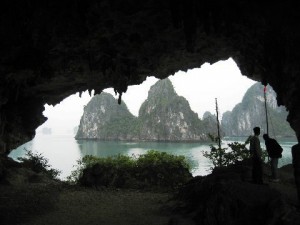
The basic boat we called home, replicating an old Chinese Junk, was…well, basic, but we dined well and huddled about the crew as they studied tidal charts to determine our daily itinerary. Inflatable canoes, powered by guides, were our vehicle of choice for purposes of exploration. Cave opening too small to navigate? No problem –- just let some air out of the canoe. Very versatile.
Some caves were so dark that we needed to don headlamps to maneuver through. Others were so small the entire trip was negotiated on our backs. But those that enthralled the most were comprised of tortured, grotesque shapes hanging from the ceiling and reflected in the water below. I felt stuck in a huge open mouth badly in need of dental work; I was Jonah inside the whale, the cave itself its gaping jaw, and the jagged stalactites above and below giant misshapen teeth.
Some caves were so dark that we needed to don headlamps to maneuver through. Others were so small the entire trip was negotiated on our backs. But those that enthralled the most were comprised of tortured, grotesque shapes hanging from the ceiling and reflected in the water below. I felt stuck in a huge open mouth badly in need of dental work; I was Jonah inside the whale, the cave itself its gaping jaw, and the jagged stalactites above and below giant misshapen teeth.
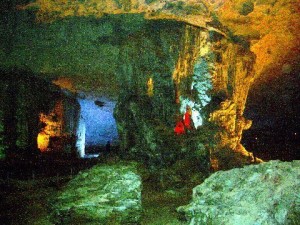
Some days we paddled into the caves. Others we trekked through them. One-hundred-forty steps up a sheer cliff brought us to Hang Sung Sot -– the over-100-foot-high, multi-chambered Surprises Cave -– which indeed it was full of.
Some chambers were back lit by sun-filled gaps in the limestone, others artificially lit for dramatic effect. I was told the name referred to the enormity of the cave –- a mile and a half walk from end to end; for me it was the huge highlighted outcropping protruding at a suggestive 45-degree angle as you rounded one of the bends, clearly a pornographic symbol that elicits giggles — if not outright guffaws – from all who come across it.
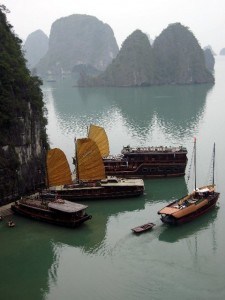
I could envision a small civilization existing here in a former lifetime, and was not surprised to hear that many Vietnamese hid in the caves during the bombings of Hanoi during the Vietnam War -– or, as they see it, the American War.
What did surprise me was some historic insight we received from our Myths and Mountains guide, arguably the best in Vietnam, Le Van Cuong. When I asked why the people of Vietnam were so welcoming to Americans after we destroyed so much of their country, he patiently explained that on their historic timeline, the Americans were just a blip: “The main reason is that historically my country has been invaded by so many countries over centuries that the Americans were responsible for just a small part of their suffering. And it is just the very nature of Vietnamese people to forgive and forget.”
Very candid about the good and bad in his country and the pros and cons of the government, his perspective on the current political climate in Vietnam was also interesting. Although the government is Communist -– what Cuong describes as “flexible communism” — the burgeoning economy reflects capitalism. “Perhaps you can smell democracy in the air but it’s going to be a while before it settles to the ground,” he observed.
But back to paddling through Ha Long Bay. Exiting the caves often brings you into a still lagoon, mirroring the multiple majesty of the soaring peaks. Jagged and ragged, alternately solid and porous, the gauzy spires seem lost in the horizon while alternately sinking below the surface of the water. Being of a certain age -– and eyesight -– I thought perhaps the surroundings appeared that way because of my cataracts –- all filmy and out-of-focus. But it is more valid vista than vision -– and therein lay their beauty.
Defying convention, one delighted paddler exclaimed as his canoe re-entered the world: “Oh my God, it’s Shangra-La.” Expanding on his initial reaction, Charles Guinn from Kansas City, Missouri, continued: “This is the most unique place I’ve ever seen in all my travels. I suspect there’s no other place like it in the world.”
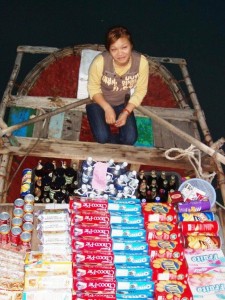
Back aboard our floating home, we traveled past a complement of water-borne vehicles that challenged the imagination: multi-colored fishing boats sporting multi-faceted protrusions; floating houses on wooden platforms with shrimp, crab and fish farms caged underneath; bamboo basket boats, and rowboats and kayaks manned by kids playing hide-and-seek behind the small islands in the Bay.
A young woman in a basket boat pulled up alongside ours selling chocolate, crackers, cookies, nuts, wine and cigarettes. Somehow all that junk food seemed appropriate considering the nature of our boat (Need I remind you we were on a Chinese Junk…?).
Relaxing on deck, we play the ancient game of what do you see in the strange formations in our midst. Or, more appropriately on Ha Long Bay’s mist. “Hey, that looks like George Washington,” “Nah, a fisherman,” “No, I think it’s a goat’s head” until the boat moves on to the next imaginary challenge.
Ruth Lerner of Venice, California, reflected on the surroundings: “Such quiet, endless beauty, so breath-taking with no two formations alike.” Her favorite part? “Floating in the kayak through pitch dark, absolutely quiet caves and emerging into lagoons as still as glass.”
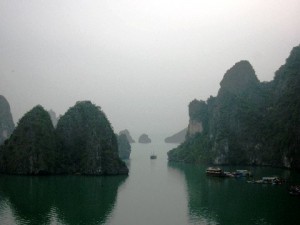
Vietnam–- a country torn between then and now, what was juxtaposed with what will be, poised in economic boom and political transition. Go now before luxury high-rise hotels flood the landscape and Westernization erodes the culture. For more information, contact Myths and Mountains at 800/670-6984 or visit www.mythsandmountains.com.

